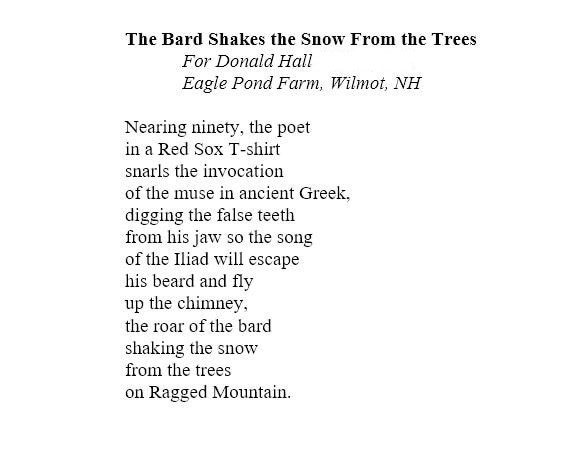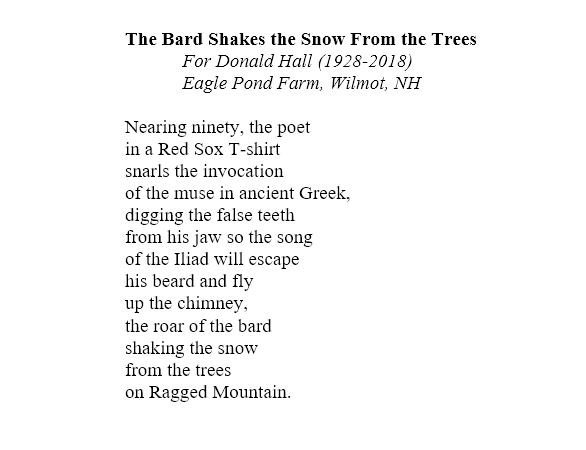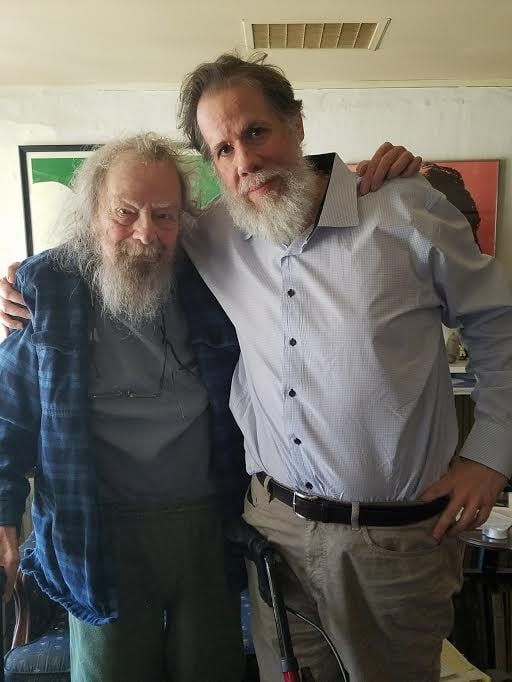

Martín Espada is a poet fluent in both life and death. He champions stories of living heroes while revivifying those gone too soon. Recipient of the 2018 Ruth Lilly Poetry Prize and author of nearly twenty books, he composes work that amplifies the voice of the righteous, rousing audiences with echoes of the epic tradition.
In “The Bard Shakes the Snow From the Trees,” Espada recalls one of his last encounters with the late poet Donald Hall. Espada has shared with us some of his final emails with Hall (see below, at the interview’s end), in which they discuss this very poem, along with baseball, among other things. Hall suggested a revision that Espada declined, though he did make one other change. Sometimes the smallest edits are the most significant.
— Ben Purkert for Guernica
Guernica: How’d you become friends with Donald Hall?
Martín Espada: We were both in the Boston-area poetry community in the late 1980s. At that time, I was working at Su Clínica Legal, a legal services program for low-income Spanish-speaking tenants. Shortly after I got out of law school in 1987, I published my second book of poems, and nobody really read it.
My third book, Rebellion Is the Circle of a Lover’s Hands, came out with Curbstone in 1990, and that made something of an impression. Don and I started corresponding around that time. He would send these very simple, typed postcards. No pictures, just white postcards. If you wrote to him, he’d write you back immediately. I don’t know how he did it.
But what really endeared Don to me was something he did in 1992. He included me in an anthology at a time when I was still fairly anonymous. It was a gesture of enormous generosity for him to include my work, not just because I was relatively unknown but because, at that time, Latino literature in general, and Latino poetry in particular, were utterly invisible. He broke through that invisibility with his usual grace.
Guernica: It sounds like a powerful moment in your journey as a poet.
Martín Espada: It was. To be included in an anthology by Donald Hall was a huge deal! And that generosity of spirit defined him. He was reaching out to someone whose work could not be more different, whose subject matter could not be more different, whose environment could not be more different. I can remember receiving postcards from Eagle Pond Farm, where he lived. Growing up in the projects of Brooklyn, I’d never seen an eagle, or a pond, or a farm. It was all exotic to me.
Guernica: What did his work mean to you?
Martín Espada: His poems about the loss of Jane Kenyon left me completely stunned. I heard him read from Without once in Cambridge and I couldn’t stop thinking about it. I still can’t. I was amazed at how somebody could turn such profound suffering into art.
Guernica: I feel like your poetry does similar work.
Martín Espada: I’ve certainly written my fair share of elegies. For me, the big test came when my father died in 2014. I think it’s something of an occupational hazard for poets over fifty. You reach a certain age and people you know start dying.
Guernica: When you drafted this poem for Hall, he was still alive, though quite up there in years. Did you write it out of some elegiac impulse, or can a poem only be an elegy once the subject has passed?
Martín Espada: I believe in elegies for the living. In other words, I am aware that someone might be nearing the end, and I write a poem for that person, which the person can still appreciate. I’ve done that a number of times. I wrote a poem called “Blessed Be the Truth Tellers” for my friend and mentor, the poet Jack Agüeros, who had Alzheimer’s Disease.
I want to be clear: I didn’t write this poem for Don as a tribute to someone already gone. Even towards the end, he was so clear-headed that it was impossible to think of him as not existing. His biggest complaint was exhaustion. We would only visit for an hour or so, and then he would get very tired. But while I was in his presence, he was just as sharp as could be. There was a fertile mind in there, thinking about life and baseball and everything else. And he was still writing. When I last visited him, he was talking about his upcoming 90th birthday while reviewing page proofs for his next book.
Guernica: In your correspondence, it’s clear that he thought highly of your poem, but objected to “bard” in the title.
Martín Espada: That was typical of him; he weighed every single word. He’d inspect every line of a poem and say, “Hmm, I think you might want to change this.” But here’s the other piece of that puzzle: Don, for all his remarkable accomplishments, was modest. He couldn’t conceive of himself in those terms. In his own eyes, he wasn’t a bard.
Guernica: What’s the difference between “poet” and “bard”?
Martín Espada: Musicality, for one thing. “The bard shakes the snow from the trees” has a more powerful resonance than “the poet shakes the snow from the trees.” But there is something else: I didn’t want to accept his suggested edit because I didn’t agree with it. He truly was bardic. When I visited him on that lonely stretch of road in New Hampshire, and he asked if I’d like to hear him recite the opening lines of the Iliad, and he began roaring in ancient Greek, I knew I was in the presence of true poetry, fire, life itself.
There was so much energy flowing through him that if all the snow fell off the trees at that moment, I wouldn’t have been surprised. I think Homer was inside Donald Hall that day, inhabiting him.
Guernica: Your work often concerns real people and their stories. How does that inform your revision process? Do you feel at all constricted, in so far as you’re obliged to tell someone else’s truth?
Martín Espada: It’s not their truth per se, but their truth as I see it. That’s a critical distinction. I’m not a ghostwriter and I’m not writing press releases. While I do write about living people, and sometimes share with them what I write, I don’t consider myself obliged to follow their every directive. At the end of the day, the creative work belongs to the creator.
I do sometimes get feedback that compels me to make a change. It’s usually factual in nature. For instance, I once wrote a poem about a friend of mine, Nelson Azócar, who worked with me at Su Clínica Legal. He had an incredible story. He was from Chile and came to this country after talking his way out of being shot by a firing squad. Now that’s the gift of gab.
I thought: I’m going to write a poem about this. When I showed it to Nelson, he said he really liked it, but he asked me to change something. In the poem, I described him as wearing a bathrobe when he was taken away to face the firing squad. It was less dignified than that; he was in his underpants. That’s the kind of detail I want to get right. It matters.
Guernica: When we first met at the Vermont Studio Center, you said something that really stuck with me. “Sometimes we poets internalize the myth of our own powerlessness.” Could you expand on that?
Martín Espada: We accept too passively, I think, our diminished place in the shadows of the society. We truly have the power to move people, to change hearts and minds. It sounds cliché but it’s true. I’ve witnessed, in many scenarios, what poetry can do. That’s why I love to bring poetry to places where it doesn’t typically belong: a prison, a halfway house, a rehab center, a boxing gym, or, in one case, a tortilla factory. When I bring poems into these places and see the response, the power of poetry is so apparent.
Indeed, there are prison poets I could name like Jimmy Santiago Baca or Etheridge Knight or Reginald Dwayne Betts who wrote their way out, as you know. As rare as it might be, it happens. There are countless instances in which I’ve seen what poetry is capable of doing. And that’s what happened with Don. I saw poetry possess the body and spirit of a man, almost ninety years old, who was so animated that he literally tore his false teeth out of his mouth and shook his fist. This was the power of poetry incarnate. My short poem is essentially saying, “I was there. I saw it.”
Guernica: You made only one edit to the poem: the addition of Hall’s birth and death dates. How does that change the reader’s experience?
Martín Espada: The reader or listener takes in the poem in an entirely different way. The poem has become a repository of remembrance.
Guernica: And yet you’ve kept it in the present tense.
Martín Espada: Absolutely. Because I believe that elegies should go beyond lamentation. They should include, not only a celebration of a life, but an element of defiance, an element of resistance. When I read this poem, I think it’s not only about defying death; it’s about defying certain stereotypes of aging. We know the usual story: you’re feeble; you remember nothing; you leave the stage quietly. Well, not Don. He did not go gentle into that good night, as Dylan Thomas would say. He roared.

March 9, 2018
Dear Martín,
I like my poem! I love “snarls,” not to mention, “digging the false teeth/ from his jaw…” The only word I even think about worrying about is “bard.” It’s right for Homer, but I’m not sure. That’s a good poem about Lauren also. I like the noises you make, always my doorway into a poem. Of course I like her, for your words about her, and for what she does…
[…]
You have to come back, and bring Lauren for me to meet.
Talk about good baseball writing. You have read Roger Angell’s books about baseball? Every time he writes me he tells me that my Dock book is one of the ten best books ever written about baseball, and I tell him, “Yeah, and you wrote the other nine.”
It’s a long way to drive up here, and as you know I am good for one hour only! Maybe you two will be driving in this direction sometime? Anyway, we will write letters – and please visit when you can visit.
That “Letter” to your father, in Poetry, is wonderful. I can’t find a word to complain about. I think of Whitman – in the best way!
I’m so glad we got together!
Don
March 9, 2018
Dear Don,
I’m so glad you like your poem! I’m going to mail you a hard copy, signed of course.
When I heard you “snarling” and saw you “digging the false teeth” from your jaw, I knew I was in the presence of poetry, fire, life itself. And yes, I was in the presence of a bard. You’re being modest! You’re worthy. In the title and at the end of the poem, “bard” refers both to you and Homer, of course. You may not be Homer (who is?), but, in that moment, you inhabited the bardic tradition, declaiming the poem with passion, invoking the muse, transcending this winter and every winter. I should say that I also think of Without as epic, tragic, bardic. You’ve been a bard, in my eyes, for a long time.
And a bard who writes about baseball, no less. Yes, I have Fathers Playing Catch With Sons, which you signed for me many years ago. I don’t have the Dock Ellis book, and would love to have it…
Did Dock Ellis really pitch a no hitter on LSD?
J.D. Martínez is a Cuban from Miami. Núñez, Devers, and Ramírez are all Dominican. Christian Vázquez is Puerto Rican and, not by coincidence, one of my favorite Red Sox. He’s a gritty, intelligent ballplayer, a commanding presence behind the plate who frames pitches well and threw out 42% of base-stealers last year (3rd in the league). And he hit .290 last year because he learned how to slash the ball to the opposite field.
[…]
Un abrazo,
Martín
March 13, 2018
Dear Martín,
Dock Ellis in the Country of Baseball will be in the mail today I believe, or maybe yesterday. My housekeeper will take it to the post office for me.
Yep, Dock really threw away no-hitter on LSD! Read all about it!
I love Vázquez and his catching. I think he will do most of it this year. We have an embarrassment of catchers! And three Dominicans. Last week I had a letter from a Dominican man who lives in New Hampshire now, and who wants to publish a translation of an old book of my poems, Kicking the Leaves from 1978. It was my seventh book and my first decent one! He’s scrambling now to get the rights to translate. Last year, believe it or not, my poems were pirated for an Arabic translation! Mysterious!
[…]
I did love it to be snarling and to be digging my false teeth!
I still think that “bard” feels archaic or ironic. Arch?
Don
March 13, 2018
Dear Don,
I’ll keep an eye out for Dock Ellis in the Country of Baseball, though at the moment I can see nothing but blinding snow from my window. The letter carrier has the unfortunate habit of flinging my mail in the snow once the mailbox fills up. Once, I discovered a book of etchings from the Spanish Civil War in a snowdrift at the bottom of my stairs. It had been there for three days. Only the resourcefulness of the book dealer, who packaged the book fastidiously, saved it from a fate it had miraculously escaped in the 1930s.
[…]
Anyway, I should credit Lauren for “digging,” not that she came up with that word, but pushed me to come up with a better word than the one I originally had there. Of “poet” and “bard,” she had this to say: “At the beginning of the poem, he’s a ‘poet’ in a Red Sox T-shirt, a friend, familiar. Then he snarls in ancient Greek, and digs the teeth from his mouth, and the ‘poet’ becomes the ‘bard,’ transforming himself with his incantation into something larger.” (If there is any irony, it might be this: who, driving by the house at that moment, could possibly imagine the extraordinary happenings within?) I like the way she thinks. So will you.
[…]
Lauren sends her greetings to you and to Linda.
Abrazos,
Martín
Reproduced with the permission of Donald Hall’s Literary Estate
To read more interviews from our Back Draft archive, click here.
